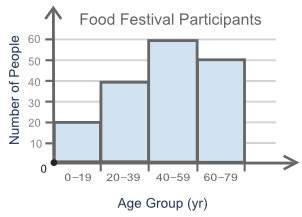
Mathematics, 24.08.2019 02:50 bellbradshaw16
Arestaurant manager recorded the number of people in different age groups who attended her food festival. she then created the following histogram:
histogram with title food festival participants, horizontal axis labeled age group (year) with bins 0 to 19, 20 to 39, 40 to 59, and 60 to 79 and vertical axis labeled number of people with values from 0 to 60 at intervals of 10. the first bin goes to 20, the second goes to 40, the third goes to 60, and the last goes to 50.
which of the following statements best compares the height of the bars of the histogram?
there are twice as many participants in the 60–79 age group than in the 0–19 age group.
there are 3 times as many participants in the 40–59 age group than in the 0–19 age group.
there are more participants in the 40–59 age group than in the 0–19 and 60–79 groups combined.
there are more participants in the 60–79 age group than in the 0–19 and 20–39 groups combined.


Answers: 2


Another question on Mathematics

Mathematics, 21.06.2019 16:30
In two or more complete sentences, determine the appropriate model for the given data and explain how you made your decision. (1,-1), (2,0.5), (5,1.5), (8,2)
Answers: 2

Mathematics, 21.06.2019 17:20
Given: hf || jk; hg ? jg prove: fhg ? kjg to prove that the triangles are congruent by asa, which statement and reason could be used as part of the proof? fgh ? kgj because vertical angles are congruent. jkg ? hfg because vertical angles are congruent. fhg ? jkg because right angles are congruent. hfg ? kjg because alternate interior angles are congruent.
Answers: 1

Mathematics, 21.06.2019 20:30
Does the function satisfy the hypotheses of the mean value theorem on the given interval? f(x) = 4x^2 + 3x + 4, [−1, 1] no, f is continuous on [−1, 1] but not differentiable on (−1, 1). no, f is not continuous on [−1, 1]. yes, f is continuous on [−1, 1] and differentiable on (−1, 1) since polynomials are continuous and differentiable on . there is not enough information to verify if this function satisfies the mean value theorem. yes, it does not matter if f is continuous or differentiable; every function satisfies the mean value theorem.
Answers: 1

Mathematics, 22.06.2019 00:00
Asequence is a function whose is the set of natural numbers
Answers: 1
You know the right answer?
Arestaurant manager recorded the number of people in different age groups who attended her food fest...
Questions

Mathematics, 28.09.2019 08:20


World Languages, 28.09.2019 08:20


Mathematics, 28.09.2019 08:20

Mathematics, 28.09.2019 08:20

Chemistry, 28.09.2019 08:20

Mathematics, 28.09.2019 08:20






Mathematics, 28.09.2019 08:20


History, 28.09.2019 08:20

Mathematics, 28.09.2019 08:20





